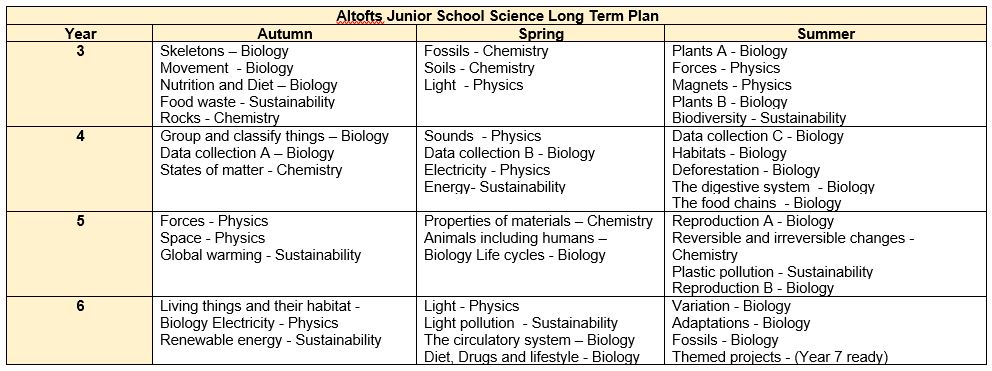Science
Intent
At Altofts Junior School, we aim to develop children's scientific knowledge and understanding of the nature, processes and methods of science, for now and the future. This includes providing a valuable opportunity to recognise their role in shaping a more sustainable future and understand how they can actively contribute to positive changes in both their local and wider environments. Our Science curriculum promotes a deeper thinking in Science alongside a fluent use of scientific language; gives a real-life context to all topics to motivate our pupils to be skilled, life-long learners in a rapidly changing world; and embraces a culture of curiosity.
We aim to ensure pupils:
- develop scientific knowledge and conceptual understanding through the specific disciplines of biology, chemistry and physics.
- develop understanding of the nature, processes and methods of science through different types of scientific enquiries that help them to answer scientific questions about the world around them.
- equip with the scientific knowledge required to understand the uses and implications of science, today and for the future.
The Science curriculum actively incorporates a number of our school curriculum drivers, specifically: Numeracy & Literacy, Oracy, Communication and vocabulary, Independence & resilience & High aspirations.
Implementation
Our Science curriculum maps out the progression of both scientific knowledge and working scientifically skills (substantive and disciplinary knowledge) throughout the academic year and ensures that the knowledge and skills are tailored to each year group. Pupils have frequent opportunities to develop their skills in, and take responsibility for, planning investigative work, selecting relevant resources, making decisions about sources of information, carrying out activities safely and deciding on the best form of communicating their findings. To support this we use the ‘TAPS Wheel’ which is available in the front of children’s books so that they can identify the skills they are developing. A small-step approach guarantees sufficient coverage and time for effective teaching and consolidation of these essential skills. ‘End of block assessment’ allows teachers to monitor pupils’ learning and helps them plan any further intervention that may be required.
Impact
● Children enjoy and are enthusiastic about Science.
● Children are confident to use and explain scientific vocabulary.
● Children can ask questions about their science learning and reflect on their knowledge.
● There is a clear progression of children’s work.
● Children become increasingly independent in Science.

Knowledge Organisers
Year 3
Year 4
Group and classify living things
Year 5
Properties and changes of materials
SpaceAnimals and living things
Reversible and Irreversible Changes








